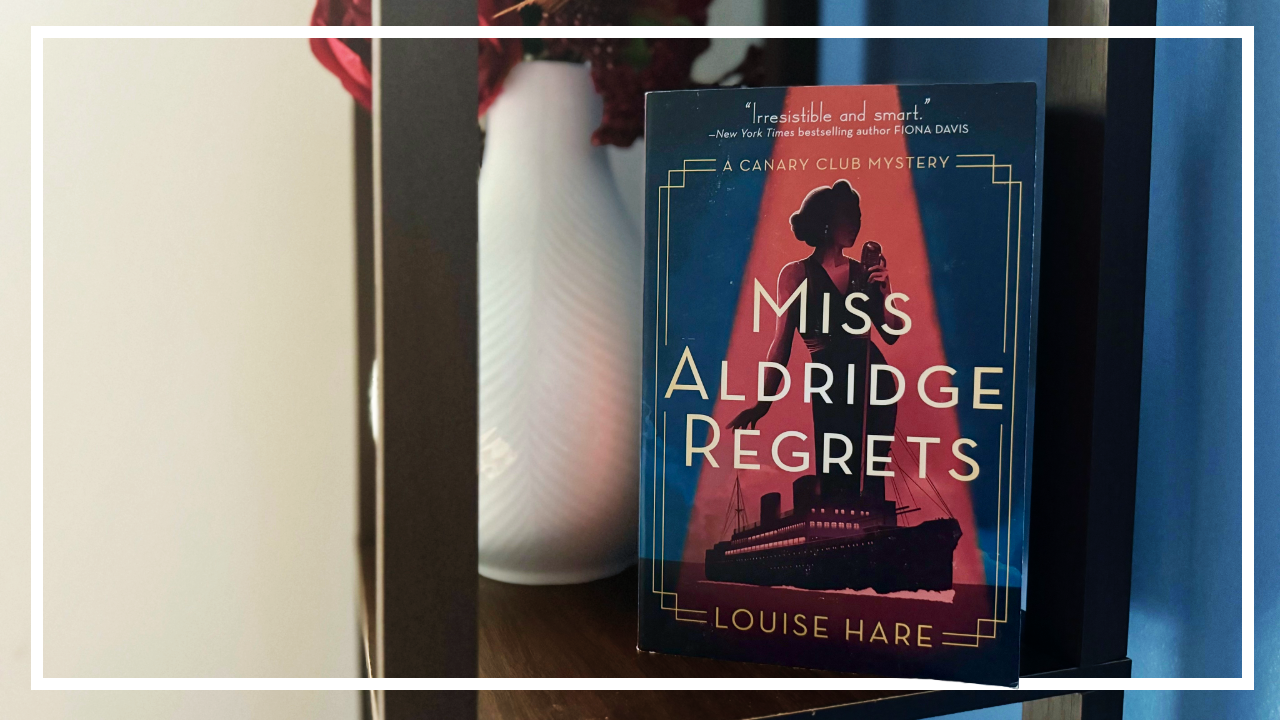Black Mystery Month continues, and this time we’re keeping things cozy – and going back in time. I’ve mentioned my love of train mysteries in the past, and that magic extends to boat settings. So as I was researching reads for this month’s posts, I was delighted to come across Miss Aldridge Regrets, a 1930s mystery set onboard the RMS Queen Mary.
The story follows the titular Lena Aldridge, a singer hoping to make it on Broadway. Despite a series of disappointments in the London showbiz scene, Lena jumps at the chance for a starring role in Broadway Musial, shepherded by a mysterious agent. As she makes the sea crossing, she falls in with the Abernathy family… And when their patriarch dies suddenly, she may need to solve the case to save herself.
Historical mysteries can be tricky reads, particularly when they’re trying to cover past attitudes for a modern reader. As that modern reader, I’ve found it difficult to know how I expect modern historical writers to cover topics like feminism or racism. While it’s easy to write a modern intersectional feminist woman, it’s much harder to know how the same woman might have felt in the past. Miss Aldridge Regrets covers a number of these thorny issues, with varying degrees of success.
Historical perspectives…
Lena herself is the focal point for many of the discussions of race in Miss Aldridge Regrets. She’s mixed-race, raised by he father, in 1930s London. The story makes it clear she can “pass” as Caucasian if she wants to – but that she still feels the pain of her class and ethnicity. And yet, I was surprised to find that that coverage of race relations felt both too overt and not enough.
We can start with the simpler writing challenge. Lena’s thoughts are full of concern about her race. She can’t let anyone aboard the Queen Mary know her background, lest they banish her to the lower classes of the ship. She snipes when a handsome staff member aboard correctly clocks her origins. And her understanding of the London club scene and her role in it constantly references her race and its impact.
And yet – in other ways, Lena’s character seems mysteriously under-impacted by that same background. Her best friend, almost-family, is white; she ensure Lena can have fine things and fancy dinners. Aboard the ship, nobody seems to suspect her origins. We don’t really see the segregation that was rampant at that time. It’s odd that Lena, so preoccupied with her own background, spares no thought to the paucity of POCs in the staterooms she frequents.
It’s hard exactly how to judge this, what to make of this. After all, it was a different time entirely, an perhaps Lena’s thoughts are a period-accurate reflection. But I found it challenging to interpret Lena as sympathetic – or at least as less than self-centered. And to some degree, that’s what you’d expect, given the major life change that she’s about to take on… But the historical element here perhaps wants a bit of “show, don’t tell”, letting us see that impact rather than just having Lena narrate her concerns.
…on a luxurious closed-circle adventure
Lena’s self-centering makes for an interesting mystery protagonist, though. It’s clear from quite early on in the story that there’s a complex plot, one Lena does not understand. If you’re like me, that makes you try to read more closely, to pick up on even tiny clues to puzzle it all out. Miss Aldridge Regrets is a family affair on an ocean crossing – a closed circle in a closed setting.
In some ways, it almost reads more like a thriller than a pure mystery, especially as each section ends with the plotter’s reflections. These interludes ensure readers know when there’s more drama to come, keeping a sense of forward momentum. But they also mean that I downplayed Lena’s own theories, knowing that the culprit had a more complex set of knowledge and motivations than she suspected. It’s an interesting version of an unreliable narrator – one where who’s unreliable because you know they’re thinking too small, but not to where they they should expand.
If all of that makes you wonder about the fair play-ness of this story, that’s a reasonable line of thought. Miss Aldridge Regrets leans more on drama and surprise than true puzzle-solving. The story propels itself with reveals and tense altercations and dramatic irony; the mystery itself is not, I think, solvable except at the meta-level. And that’s fine; the point of this story is to observe and react to the wild shenanigans of the Abernathy family, not to truly solve a mystery. With each revelation, we get to gawk at more excesses; even for Lena, the story ends more than it resolves.
Final rambles
Did I enjoy Miss Aldridge Regrets? Yes. Will I read another in the series? Probably not for a while. Lena’s not my precise cup of tea as a protagonist – she lacks the agency that makes me love other historical mystery heroines. But if you’re in the market for a closed-circle mystery-adventure on a 1930’s ocean liner, it’s worth giving a try. And if you love stories of glamorous dresses and rich excesses, this might be your read.
For the next Black Mystery Month reads, I’ll bring us back a little closer to modern times, with some musical mysteries. Until then – stay cozy, and stay curious!
This will count for my 52 Book Challenge as a book with “Chapter Headings that Have Dates”!
